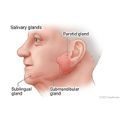Healthwise
Our Health Library information does not replace the advice of a doctor. Please be advised that this information is made available to assist our patients to learn more about their health. Our providers may not see and/or treat all topics found herein.
Sjögren's Syndrome
Condition Basics
What is Sjögren's syndrome?
Sjögren's syndrome (say "SHOH-grins") is a disease in which the immune system attacks the glands that make moisture for the body, such as tears and saliva. The damage keeps the glands from working the way they should and makes your eyes and mouth dry.
The disease may also cause other problems, such as fatigue and pain in the joints. In rare cases, it can damage the lungs, kidneys, and nerves.
Anyone can get Sjögren's, but it's most common in women who are in their 40s and 50s.
What are the symptoms?
The most common symptoms of Sjögren's syndrome are very dry eyes and mouth that last for at least 3 months and are not caused by medicines. You may have itching and burning in your eyes. Your mouth may feel very dry, as though it is full of cotton.
How is it diagnosed?
Your doctor will examine you and ask about your symptoms and past health. You will be asked about any medicines you take that could cause dry eyes and mouth. The doctor may want to do tests that measure tear flow and saliva. Your blood may also be checked for antibodies.
How is Sjögren's syndrome treated?
Your treatment for Sjögren's syndrome will depend on how the disease affects you. In most cases, treatment will focus on helping you control your symptoms. Treatment may include products to help with dry eyes and mouth, or medicine to relieve pain. Stronger medicines may be recommended if these treatments don't control symptoms.
How can you care for yourself?
There are things you can do to relieve some of the symptoms caused by Sjögren's syndrome. Try using drops or ointments for dry eyes. You can use saliva substitutes for dry mouth, a humidifier for a dry nose, or vaginal lubricants. If you have joint pain and swelling, anti-inflammatory medicines may help.
Credits
Current as of: October 25, 2024
Current as of: October 25, 2024




